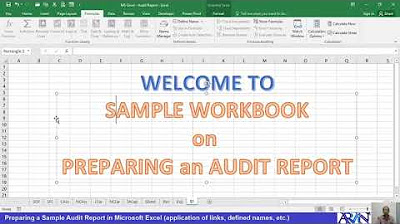Audit Preparation and Planning | How to
Summary
TLDRThis video, created in collaboration with the Lean Community, offers a comprehensive guide on how to prepare and conduct an effective audit. It covers the importance of defining the type of audit, whether it’s product, process, or system-based. Key points include the need for both professional and personal skills, the preparation of an audit plan and program, and the importance of listening and evaluating evidence. The video emphasizes the golden rules of auditing to ensure that audits are conducted systematically, thoroughly, and without bias.
Takeaways
- 😀 The term 'audit' originates from the Latin word 'audire', meaning 'to hear'.
- 😀 The main goal of an audit is to evaluate a condition or situation to determine if requirements are met.
- 😀 Audits are typically carried out by professionals known as auditors, who must possess both technical and personal skills.
- 😀 Audits can be categorized into three types: product, process, and system audits, depending on the industry.
- 😀 Product audits check if parts meet technical specifications, process audits evaluate adherence to defined rules, and system audits assess the overall functioning of an organization.
- 😀 To perform a proper audit, auditors must have professional qualifications (hard skills) and soft skills like communication and listening.
- 😀 Preparation is crucial for a successful audit, including creating an audit plan and program ahead of time.
- 😀 An audit program helps define the specific steps and evidence needed to verify whether requirements are met during the audit.
- 😀 Auditors should always listen first and evaluate the situation before offering their opinion to avoid misjudgments or misunderstandings.
- 😀 The '10 golden rules' of auditing include ensuring professionalism, preparation, clear communication, and evidence collection while maintaining impartiality and adhering to the audit scope.
Q & A
What is the primary goal of an audit?
-The primary goal of an audit is to evaluate a condition, object, or situation in an intended way to determine whether the requirements are met.
What are the main categories of audits in the manufacturing industry?
-In the manufacturing industry, audits can generally be categorized into three families: 1) Product audit (checking if parts comply with technical specifications), 2) Process audit (evaluating if people, machines, and documents follow defined rules to ensure customer satisfaction), and 3) System audit (evaluating all company processes to ensure the business runs smoothly and meets customer satisfaction while using continuous improvement).
Why is it important for an auditor to have both professional and personal skills?
-It is important because an auditor needs to have the professional competencies to assess the situation effectively, as well as the personal skills to communicate, listen, and handle difficult situations in a constructive way. Without these skills, an audit can fail to deliver the necessary results.
What is the significance of preparing an audit plan?
-Preparing an audit plan is crucial as it defines schedules, frequency, and provides the time needed for proper preparation. It ensures that auditors follow specific rules and have a clear structure to guide the audit process.
What is an audit program, and why is it important?
-An audit program outlines the detailed steps to be checked during the audit. It helps auditors determine what to focus on and what evidence to collect in order to prove that requirements are met, ensuring a thorough and systematic approach to the audit.
Why should an auditor listen before talking during an audit?
-An auditor should listen before talking because the role of an auditor is to evaluate based on observations, not to impose personal opinions. Listening first allows the auditor to understand the situation and avoid making assumptions that could lead to frustration or inaccurate conclusions.
What is one common mistake auditors make during audits?
-A common mistake auditors make is starting the audit with their own preconceived ideas and then searching for conditions that match those ideas, instead of objectively evaluating the actual situation. This can lead to frustration and problems in the audit process.
What are the 10 golden rules for performing a proper audit?
-The 10 golden rules for a proper audit are: 1) Ensure professional qualification (hard skills), 2) Ensure personal qualification (soft skills), 3) Never perform an audit by surprise, 4) Do not improvise, 5) Prepare an audit plan in advance, 6) Prepare an audit program, 7) Explain the scope of the audit to the people, 8) Collect evidence, 9) Be ready to listen to all, 10) Evaluate based on requirements, not personal experience.
Why is it essential not to perform an audit by surprise?
-Performing an audit by surprise can create unnecessary stress and disrupt the regular workflow, which could lead to inaccurate results. It's important to plan and communicate the audit in advance to ensure that all involved parties are prepared and can contribute to a smooth audit process.
What should an auditor focus on when collecting evidence during an audit?
-When collecting evidence, an auditor should focus on gathering the necessary information to prove that the requirements are met. This involves observing processes, checking records, and ensuring that the evidence supports the compliance with defined standards and specifications.
Outlines

This section is available to paid users only. Please upgrade to access this part.
Upgrade NowMindmap

This section is available to paid users only. Please upgrade to access this part.
Upgrade NowKeywords

This section is available to paid users only. Please upgrade to access this part.
Upgrade NowHighlights

This section is available to paid users only. Please upgrade to access this part.
Upgrade NowTranscripts

This section is available to paid users only. Please upgrade to access this part.
Upgrade NowBrowse More Related Video
5.0 / 5 (0 votes)





